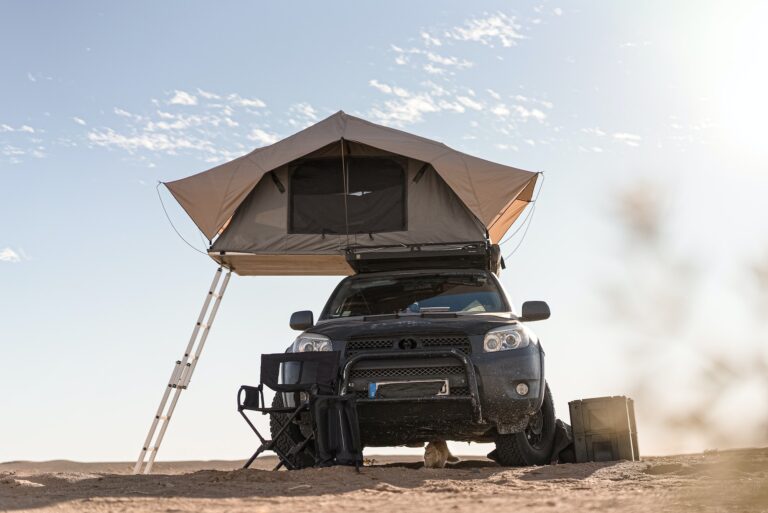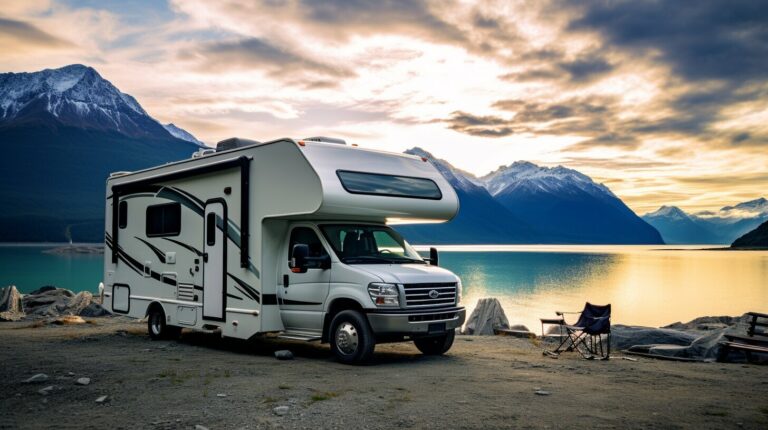Welcome to the world of RV living! This lifestyle can bring endless adventures and unforgettable memories while allowing you to save money. But before you hit the open road, it’s essential to understand the costs associated with living in an RV.
RV living expenses include campground fees, gas, maintenance, and groceries, among others. These costs can add up quickly, but with proper planning and budgeting, you can enjoy the freedom of the open road without breaking the bank.
In this article, we will provide you with a comprehensive guide to RV living expenses and how to manage them. From budgeting for full-time RVing to finding affordable campgrounds, we’ve got you covered. Let’s get started on your journey to affordable road adventures!
Budgeting for RV Living
Living in an RV can be an incredibly cost-effective way to travel and explore new places. However, it’s important to have a solid financial plan in place before hitting the road. Here are some tips on how to budget for full-time RV living:
Track your expenses
One of the first steps in creating a budget is to track your expenses. This will help you understand where your money is going and identify areas where you can cut back. There are many apps and online tools available to help you track your expenses while on the road.
Identify your needs and prioritize
It’s important to identify your needs and prioritize them when creating a budget for RV living. For example, campground fees and fuel costs are essential expenses, while eating out at restaurants may not be as important. Prioritizing your expenses will help you stay within your budget.
Find ways to save money
There are many ways to save money while living in an RV. For example, you can save on campground fees by staying at state or national parks, using discount programs, or boondocking. You can also save on fuel costs by driving at a consistent speed, reducing weight in the RV, and using gas rewards programs.
Tip: Planning ahead is key to saving money on RV living expenses.
RV Living Cost Breakdown
When it comes to RV living expenses, it’s important to know where your money is going. Here’s a breakdown of the different costs you can expect:
| Expense | Average Cost |
|---|---|
| Campground Fees | $30-$50 per night |
| Fuel | $3-$4 per gallon |
| Maintenance | $1,000-$2,000 per year |
| Groceries | $300-$500 per month |
These are just rough estimates, and your actual costs will vary depending on the type of RV you have, how often you travel, and your personal spending habits.
To save money on campground fees, consider staying at state parks or national forests, where prices can be much lower. You can also look for off-the-beaten-path campgrounds that may not be as well-known and therefore less expensive.
When it comes to fuel costs, try to plan your route ahead of time to avoid unnecessary driving. You can also look for gas rewards programs and use apps to find the cheapest gas prices in the area.
Regular maintenance is important for keeping your RV in good condition and preventing costly repairs down the road. Performing basic tasks like checking your tires and changing your oil can save you money in the long run. Consider learning basic repair skills so you can handle some repairs yourself and save on labor costs.
For groceries, buying in bulk and cooking meals in your RV can be a great way to save money. Look for local farmers markets to get fresh produce at lower prices.
Remember to track your expenses and adjust your budget as needed. With some planning and smart spending, you can enjoy the freedom and adventure of RV living without breaking the bank.
Finding Affordable Campgrounds
When it comes to RV living expenses, campground fees can quickly add up. However, there are a variety of options for finding affordable campgrounds while on the road.
State parks and national parks are often more budget-friendly than private campgrounds. In addition, many state parks offer discounts for senior citizens, military personnel, and disabled individuals.
If you’re willing to venture off the beaten path, there are plenty of free and low-cost camping options available. Websites like Freecampsites.net and Campendium.com offer information on free and low-cost camping areas across the United States.
Another way to save money on campground fees is by using discount programs and memberships. Programs like Passport America and Good Sam offer discounts at participating campgrounds across the country.
| Campground Type | Average Cost Per Night |
|---|---|
| State Parks | $20-$40 |
| National Parks | $15-$35 |
| Private Campgrounds | $30-$60 |
Tip: Planning ahead can also help you save money on campground fees. Research campsites and book reservations in advance to take advantage of early bird discounts. Additionally, booking longer stays may also result in discounted rates.
Ultimately, finding affordable campgrounds while RVing comes down to doing your research and being willing to explore your options. Whether you prefer state parks, national parks, private campgrounds, or free camping, there are plenty of budget-friendly options available for your next road adventure.
Saving Money on Fuel
One of the biggest expenses of RV living is fuel. However, there are several ways to save money on gas while traveling in an RV.
- Drive at a consistent speed: speeding up and slowing down frequently can decrease fuel efficiency. Consistently driving at a moderate speed can help save gas.
- Use cruise control: using cruise control on highways can help maintain a steady speed and save gas.
- Reduce weight in the RV: carrying unnecessary weight can decrease fuel efficiency. Removing excess items can help save on gas.
- Use gas rewards programs: many gas stations offer rewards programs that provide discounts or cashback on gas purchases. Taking advantage of these programs can help save money.
- Find cheaper gas prices: using apps such as GasBuddy can help locate cheaper gas prices along your route.
- Plan routes to maximize fuel efficiency: planning a route with fewer hills and stops can help save on gas.
By implementing these tips, you can save money on gas while traveling in your RV, allowing you to enjoy your road adventures without breaking the bank.
RV Maintenance on a Budget
Maintaining an RV is essential for preventing costly repairs down the road. However, keeping up with maintenance tasks doesn’t have to break the bank. Here are some tips for performing basic RV maintenance on a budget:
| Task | Cost-Saving Tips |
|---|---|
| Oil Changes | Change the oil yourself instead of taking it to a mechanic. Look for deals on oil and filters at auto parts stores. |
| Tire Checks | Check tire pressure regularly and invest in a tire pressure gauge. Rotate and balance tires to extend their lifespan. |
| Battery Maintenance | Keep battery terminals clean and use a battery tender to keep the battery charged without overcharging it. |
Learning basic RV repair skills can also save you money in the long run. There are plenty of online resources and how-to videos available to teach you how to fix common RV problems. Additionally, having an emergency fund specifically for unexpected RV repairs can provide peace of mind and help you avoid debt.
Remember, taking care of your RV is crucial for its longevity and your safety on the road. By following these cost-saving tips and investing in maintenance now, you can avoid costly repairs in the future and enjoy your RV adventures worry-free.
Saving Money on Groceries While RVing
One of the great benefits of RV living is the flexibility it affords when it comes to meal planning and preparation. While it may seem daunting to keep grocery costs low while on the road, with some careful planning, it is possible to save money without sacrificing nutrition or taste.
Meal Planning
One of the most effective ways to save money on groceries is meal planning. Create a weekly meal plan that takes into consideration the size of your RV kitchen, cooking appliances, and storage capacity. Choose meals that use common ingredients to reduce waste and plan meals around seasonal produce to take advantage of lower prices. With some thoughtful planning, you can save time, money, and have healthy meals ready to go.
Buy in Bulk
When possible, buy groceries in bulk to save money. This is particularly useful for non-perishable items such as rice, pasta, nuts, and canned goods. Many grocery stores offer discounts for bulk purchases, and by buying less frequently, you also save on fuel costs. Just be sure to store bulk items carefully to prevent spoilage or insect infestations.
Visit Local Farmers Markets
Shopping at local farmers markets is a great way to save money on fresh produce while supporting local farmers. Prices at farmers markets are often less expensive than at grocery stores, and the quality is typically superior. You can also sample the produce before committing to a purchase, ensuring you get the freshest and most delicious fruits and vegetables.
Cook Meals in the RV
One of the advantages of RV living is the ability to cook meals in your own kitchen. This is not only a great way to save money on restaurants, but it also allows you to control the quality and nutritional value of your meals. Invest in a good set of pots and pans, and make sure your pantry is stocked with basic ingredients such as spices, oils, and condiments. With a little bit of creativity and planning, you can create delicious, healthy meals in the comfort of your RV.
By implementing these tips and strategies, you can save money on groceries and still enjoy healthy, delicious meals while RVing. With a little bit of practice and planning, you’ll find that it’s not only easy to keep grocery costs low but also fun and rewarding.
Frequently Asked Questions about RV Living Expenses
Living on the road can be an exciting adventure, but it also comes with its own set of challenges and expenses. Here are some commonly asked questions about RV living expenses and how to manage them.
How much does it cost to live in an RV full-time?
The cost of living in an RV full-time can vary depending on factors such as the size of your RV, your travel plans, and your personal lifestyle. However, a general estimate is that it can cost between $1,500 to $3,000 per month to live in an RV full-time. This includes expenses such as campground fees, fuel, maintenance, groceries, and entertainment.
How can I budget for full-time RV living?
Creating a budget is an essential part of managing RV living expenses. Start by tracking your expenses for a few months to get a sense of your spending habits. Then, prioritize your needs and look for ways to save money. Use technology such as budgeting apps and online tools to help manage your finances on the road. Remember to account for unexpected expenses, and have an emergency fund set aside for unexpected repairs or emergencies.
What are some tips for finding affordable campgrounds?
There are many ways to find affordable campgrounds, including state parks, national parks, and private campgrounds. Look for discount programs such as Good Sam or Passport America, and consider staying off the beaten path to avoid peak season prices. Planning ahead can also help you save money on campground fees.
How can I save money on fuel while traveling in an RV?
Fuel can be a significant expense when traveling in an RV. To save money on fuel, try driving at a consistent speed, using cruise control, and reducing weight in your RV. Look for gas rewards programs and find cheap gas prices along your route. Planning your route to maximize fuel efficiency can also help you save money on fuel.
What are some basic RV maintenance tasks I can perform on a budget?
Basic RV maintenance is essential to prevent costly repairs down the road. Some tasks that you can perform on a budget include checking your tires, changing your oil, and inspecting your RV’s exterior. You can also learn basic repair skills to tackle small repairs yourself. It’s also important to have an emergency fund set aside for unexpected repairs or emergencies.
How can I save money on groceries while RVing?
One way to save money on groceries is by meal planning and buying in bulk. Look for local farmers markets to find fresh produce at affordable prices. Cooking your meals in the RV instead of eating out can also help you save money. Remember to balance cost-saving measures with maintaining a healthy and balanced diet.
What are some other expenses to consider when living in an RV full-time?
In addition to the expenses mentioned above, there are other costs to consider when living in an RV full-time. These include insurance, personal expenses such as entertainment or hobbies, and any RV upgrades or repairs. It’s important to include all of these expenses in your budget and plan accordingly.
Managing RV living expenses can be challenging, but with a little planning and budgeting, you can enjoy the freedom and adventure of the open road without breaking the bank.






